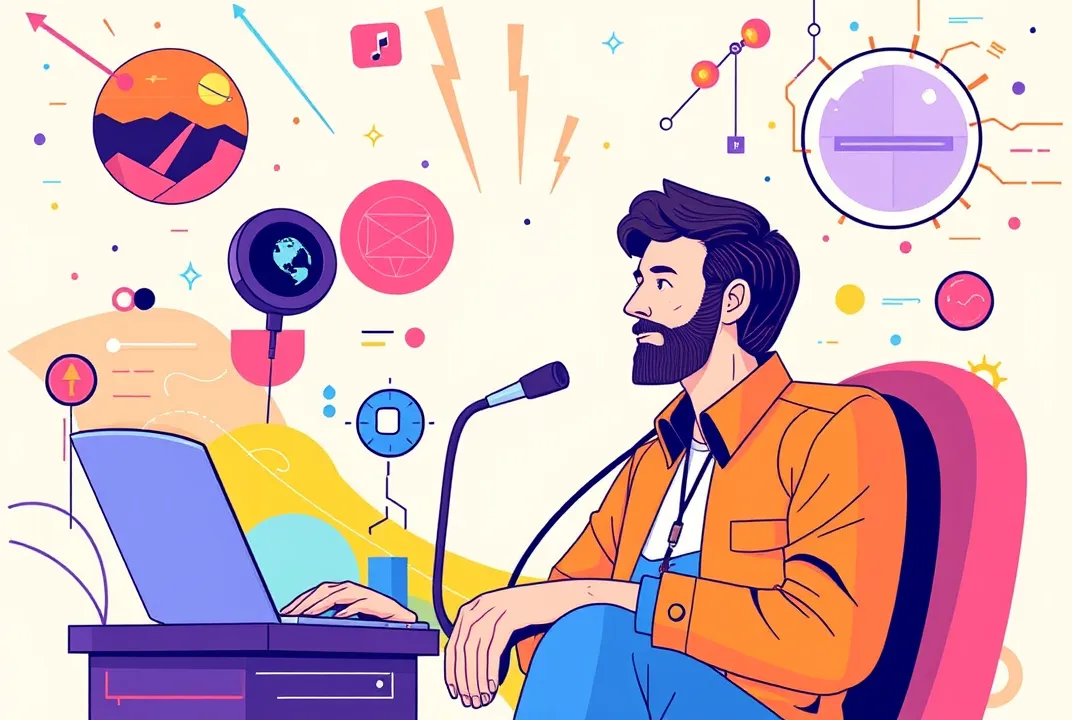Navigating the Sea of Change: The Impact of AI on Modern Workplaces
In an era defined by rapid technological advancement, few topics spark as much debate as artificial intelligence (AI) and its growing influence on the workplace. With AI tools becoming not only commonplace but essential, the consequences for businesses and employees alike are profound. Whether viewed through the lens of opportunity or disruption, the conversation around AI's role in our professional lives is critical for understanding the future of work.
The Rise of AI in the Workplace
A Journey Through Evolution
The story of AI began decades ago, rooted in the field of computer science. In the early 1950s, pioneers like Alan Turing laid the groundwork, questioning whether machines could think. Fast forward to the 21st century, and we are witnessing the manifestation of those theories through powerful algorithms and machine learning models capable of analyzing data, making predictions, and even engaging in conversation.
In recent years, the expansion of AI technologies such as natural language processing and computer vision has heralded a new era for businesses. From chatbots to advanced data analytics, AI applications are reshaping industries across the globe. A study by McKinsey & Company revealed that around 70% of companies are expected to adopt at least one form of AI by 2030, underscoring its rapid integration into everyday operations.
Recent Developments Shaping AI
The last few months have seen significant strides in AI capabilities and acceptance. Major tech companies have announced tools designed to enhance workplace productivity. Google’s introduction of AI-driven features in Google Workspace, including improved document editing and content suggestions, illustrates how giants are adapting to AI's promise.
Furthermore, an intriguing report from the World Economic Forum indicates that while AI will create 97 million new roles by 2025, it will simultaneously displace an estimated 85 million jobs. This paradoxical relationship between creation and destruction is a central theme as organizations grapple with transformation.
The Benefits of AI Integration
Enhancing Productivity and Efficiency
AI's primary allure in the workplace lies in its ability to boost productivity. Automating routine tasks liberates employees from monotonous duties, allowing them to focus on more strategic initiatives. For instance, AI-powered customer service tools can handle common inquiries, enabling human agents to tackle complex issues that require emotional intelligence.
Consider a scenario in a financial firm: a chat assistant can process simple transactions or answer client questions around the clock, drastically reducing wait times. Research indicates that businesses that employ AI tools see an average productivity increase of 40%. This creates a more efficient workplace and drives increased profitability.
Better Data-Driven Decision Making
In today's data-centric world, AI provides invaluable insights that facilitate informed decision-making. By analyzing vast datasets quickly, AI tools can identify trends and patterns that may elude human analysts. This empowers companies to pivot strategies, enhance product offerings, and refine marketing efforts based on real-time feedback.
For example, retailers use AI algorithms to analyze customer purchasing habits, allowing them to tailor inventory and marketing strategies to consumer demands. This adaptive approach not only boosts sales but also enriches customer experiences by anticipating needs.
The Challenges to Consider
Job Transformation and Displacement
While the benefits of AI are noteworthy, the transition is not without hurdles. As machinery takes over more tasks traditionally performed by humans, concerns arise surrounding job displacement. Workers in industries such as manufacturing, retail, and transportation are especially vulnerable.
A poignant illustration of this was witnessed during the COVID-19 pandemic when many businesses accelerated their digital transformations. Stories emerged of jobs lost to automation, prompting discussions about retraining and upskilling the workforce. Leading corporations have started investing in reskilling programs to assist employees in navigating the changing job landscape, yet the efforts remain insufficient for many.
Ethical Concerns and Bias
The ethical implications of AI deployment also warrant serious consideration. Algorithms can inadvertently perpetuate biases present in the training data, leading to skewed results that could adversely affect hiring practices, loan approvals, or customer service responses. Organizations must be vigilant about addressing these biases to avoid perpetuating inequality.
In light of this, regulatory bodies are beginning to scrutinize AI systems more closely. The European Union has proposed legislation aimed at establishing guidelines for ethical AI use, emphasizing the need for transparency and accountability.
The Human Element: Navigating Change Together
Collaboration Over Competition
As we integrate AI into the fabric of workplace culture, the necessity for human-AI collaboration becomes clear. Rather than viewing AI as a competitor, organizations can leverage it to augment human capabilities. This symbiotic relationship fosters innovation and cultivates a culture of continuous improvement.
Reimagining Roles and Responsibilities
As routine tasks become automated, new roles will emerge—roles that require a uniquely human touch. Skills such as creativity, emotional intelligence, and critical thinking will become increasingly valuable. Companies should prioritize fostering these skills through training and development initiatives.
For example, while AI can analyze trends in consumer behavior, it cannot replicate the nuanced understanding of consumer emotions. This dimension reinforces the need for businesses to invest in their most valuable asset: their people.
Looking Ahead: The Future of Work
Embracing an Evolving Landscape
As AI continues to evolve, so too will workplace dynamics. Organizations that embrace change and adapt to new technologies will thrive, while those that resist may find themselves left behind. It’s essential for leaders to cultivate a culture that encourages experimentation and innovation, allowing employees to explore AI's potential fully.
The Role of Education and Lifelong Learning
Ultimately, the key to successfully navigating the AI landscape lies in education. Institutions must evolve to prepare future generations for the demands of tomorrow's workforce. Lifelong learning initiatives will become paramount as professionals seek to remain relevant in an age of relentless change.
Conclusion: A Collaborative Future
The integration of AI into the modern workplace is not just a technological shift; it’s a paradigm shift that necessitates a rethinking of how we view work, our roles, and our relationships with machines. As we stand on the brink of this new frontier, fostering collaboration between humans and AI, addressing ethical challenges, and emphasizing the importance of continuous learning will be essential for building a future where both workers and technology coexist harmoniously.
The ability to adapt, learn, and innovate will define success not just for organizations, but for individuals as they navigate the ever-evolving landscape of work. It’s time to embrace this transformation, not merely as a challenge, but as an extraordinary opportunity to redefine how we work and, ultimately, how we thrive.


 Sam Altman: Revolutionizing the Future of Tech and Entrepreneurship
Sam Altman: Revolutionizing the Future of Tech and Entrepreneurship
 Intel CEO Pat Gelsinger: Driving Innovation and Growth Forward
Intel CEO Pat Gelsinger: Driving Innovation and Growth Forward
 Understanding SoftBank: A Deep Dive into Its Investment Strategy
Understanding SoftBank: A Deep Dive into Its Investment Strategy
 Broncos vs Chargers: A Battle of AFC Rivals Unfolds"
Broncos vs Chargers: A Battle of AFC Rivals Unfolds"
 Auto Fire: Revolutionizing Vehicle Safety and Emergency Response Systems
Auto Fire: Revolutionizing Vehicle Safety and Emergency Response Systems